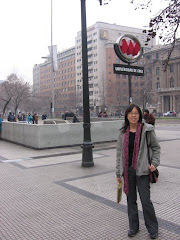Disasters and their consequences
Well, here I am, seven years after 9/11, five years after the Great Blackout of 2003, one year after traveling to the earthquake zone around Chincha, Peru, and once again in the midst of a disaster zone: Houston after Hurricane Ike.
I've been living in Sugar Land, just southwest of Houston, all summer. I've been job-hunting and planning on moving to either the East or West coast. However, a variety of factors has kept me here longer than anticipated. I'm beginning to suspect that one of them is that God intends for me to experience as many different kinds of disasters as possible. I have to say, as much pain and stress as they entail, I've learned a lot and may even be grateful for each disaster I've experienced.
I think 9/11, as I've shared below, gave me a framework to understand suffering and tragedy, and the possible redemptive effects of it. It also gave me a sense of what's really important in life at an early age, when my friendships were not yet very deep and my aspirations were vague and directionless.
The blackout in New York City showed me the resilience of New Yorkers, a people who after all had the perspective of having been through a terrorist attack. Work and busy schedules ceased, people held block parties and took in their neighbors. Hotel patrons locked outside of their rooms (the downside of electronic keycards) actually slept outside on the steps or sidewalks of New York and passed the night in safety. Everyone took a break from their TVs and laptops and engage in old-fashioned pastimes like conversation by candlelight or board games.
The earthquake in Peru, the only disaster in which I was an aid worker/reporter and not a resident, was more like a bird's-eye view of what disaster does to the have-nots. I learned that millions of dollars in aid don't do much good if they're stolen or distributed inefficiently. I saw that the real problem was not the earthquake event itself, but the poverty and exclusion which led people to build their homes out of mud in shantytowns in the first place (which of course promptly fell down in the quake while more expensive brick and concrete structures survived). Over a year later, most of their neighborhoods have not been rebuilt; both a cause and an effect is that these people have hardly any voice in the political process. I learned, as we saw in our own country from Katrina, that the poor do not have many resources with which to build their lives, and therefore are forgotten more quickly and suffer more profoundly than the rich.
Now, in a large and fairly prosperous American city which has been hit by a hurricane, I am learning the limitations of our very lifestyle. After 9/11 or the blackout, the solution was to go back to living our normal lives as soon as possible. Now, in light of energy crises and economic crises, I'm not sure how sustainable that is. In the capital of oil, we are suffering gas shortages. In a city built around cars and sprawl, we are experiencing the disadvantages of scale. With our infrastructure down, and electricity being restored agonizingly slowly, one wonders whether we have the money or political will for the major overhaul our infrastructure needs. Over time I'm sure Houston will be able to repair most of the damage. But what if hurricanes start hitting Houston more frequently? New Orleans is still not the same three years later; what will happen to Houston after a few more Ikes or Katrinas? Maybe I'm being pessimistic, but I think we may all start to feel a little more vulnerable and less self-sufficient from now on. (I write these lines from the house of a friend from my parents' church, who has generously taken us in until our power is back on.)
All in all, there is much that we can take from disasters. I hope we don't become so afraid of them, or caught up in just their economic costs, that we fail to recognize the obvious implications: that we are not in control of our own destinies, much as we would like to believe we are, and that we have to support each other (which requires forming actual relationships with our neighbors instead of holing up in our own homes and lives) sooner or later in this unpredictable world.
SOOO Behind
15 years ago


No comments:
Post a Comment